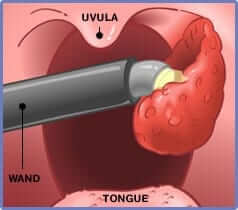Did you know that...
Coblation is a state-of-the-art surgical technique that uses radiofrequency energy and natural saline to create a low-temperature plasma field. Coblation makes it possible to separate, remove or reduce tissue at a molecular level and stop bleeding if necessary.
As a very precise technique, coblation does not affect the surrounding tissue since plasma is generated only within 100-200 μm around the electrode.
For more information please go to: www.mytonsils.com
